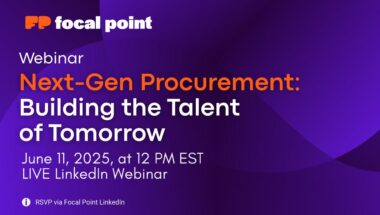Procurement is a rapidly evolving function. The demands on procurement teams continue to grow and expand in scope, as do the skills necessary to operate efficiently and effectively.
In a recent Talking Supply Chain podcast episode, Daniel May, Director of Procurement Talent Development at NASPO explored how the sector is grappling with a talent shortage that threatens to disrupt operations across both public and private sectors. The conversation underscored a sobering statistic: over 70% of procurement organizations are struggling to find the right talent. The question looms—how can procurement teams adapt to this challenging reality?
Talent Shortages and Their Impact on Procurement
Procurement, once viewed as a primarily cost-saving function, now works as a critical driver of organizational strategy, security, sustainability, and resilience. And yet, many organizations—even large enterprises and public sector organizations—remain ill-equipped to attract and retain the talent needed to thrive.
As May pointed out, public sector procurement faces unique hurdles:
- Complex regulations and policies requiring specialized skill sets
- Lack of public awareness about procurement’s role in essential services, such as infrastructure development and social programs
- A widespread lack of visibility into procurement career opportunities among younger generations
These challenges aren’t limited to government agencies. Large enterprise organizations are facing similar issues, particularly as procurement roles expand to include responsibilities such as ethical sourcing, ESG compliance, and data management.
The result? Many teams are stretched thin, over-reliant on manual processes, and struggling to focus on strategic objectives amidst employee churn.
Technology: The Bridge to a Resilient Procurement Function
While this talent shortage poses a significant challenge, it also presents an opportunity to rethink how procurement teams operate. As organizations work to fill vacancies and upskill employees, the right procurement technology can serve as a critical tool to enable efficiency.
Here’s how:
- Reducing Manual Tasks
Much of procurement’s day-to-day work—contract management, data aggregation, supplier communications—remains manual and time-intensive. This not only burdens existing staff but also creates inefficiencies and bottlenecks that exacerbate the impact of talent shortages. Focal Point’s automation capabilities can transform these processes, allowing teams to focus on high-value activities like supplier relationship management and strategic planning.
- Centralizing Data and Processes
One recurring theme in the podcast was the fragmentation of procurement workflows. Enterprise procurement teams often operate across disconnected systems, leading to data silos and inefficient decision-making. With a centralized procurement operating system like Focal Point, organizations can integrate data, processes, and teams into a single, cohesive platform—improving collaboration and enabling smarter, faster decisions.
- Empowering Teams in the New Procurement Landscape
The evolving role of procurement demands new skills and approaches, from ESG-focused initiatives to advanced analytics. By eliminating repetitive tasks and providing real-time insights, Focal Point allows teams to adapt to these changes more effectively.
Rethinking Procurement Talent
As highlighted in the Talking Supply Chain episode, initiatives like NASPO’s high school outreach and apprenticeship programs are vital to addressing the long-term talent gap. However, these efforts take time. In the short term, technology offers a practical solution to empower existing teams and mitigate the impact of talent shortages.
Focal Point isn’t just another tool in the tech stack—it’s an operating system designed to future-proof procurement. By reducing dependency on manual labor and streamlining workflows, it enables procurement teams to thrive, even in the face of widespread talent churn.
The future of procurement will be built on a combination of strategic hiring and smarter technology. With the right solutions in place, organizations can not only weather today’s challenges but emerge stronger, more resilient, and better equipped for the road ahead.
Learn more about how Focal Point can centralize and empower your procurement organization here.



